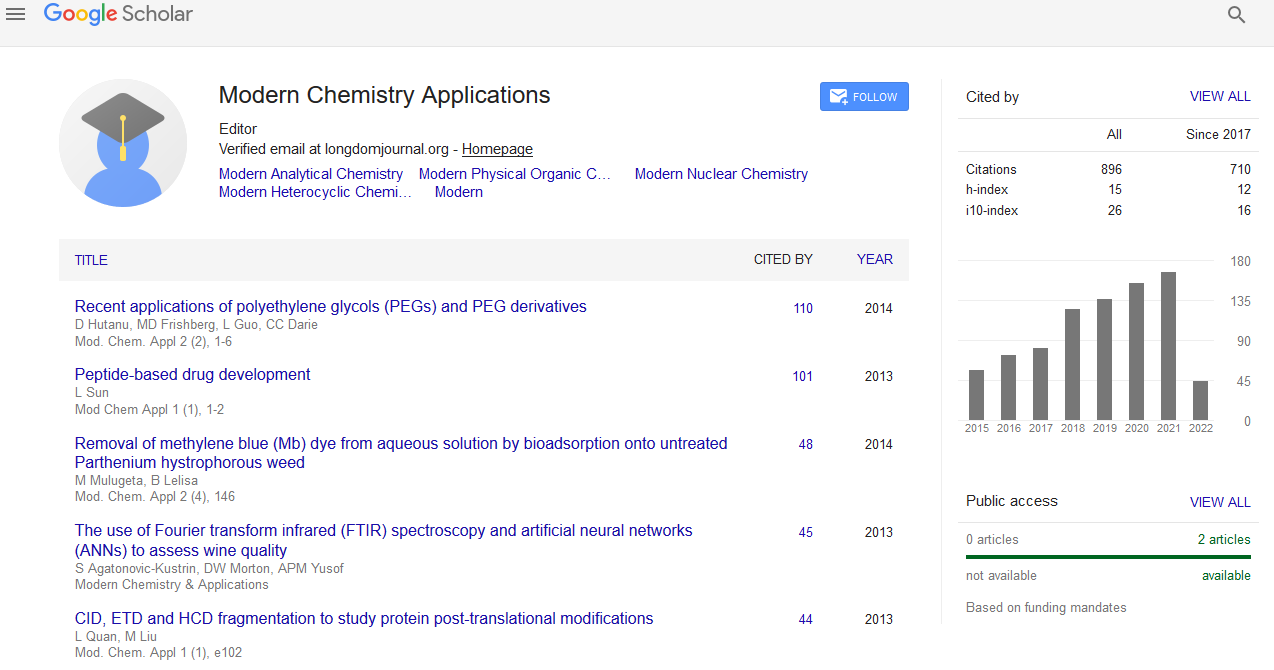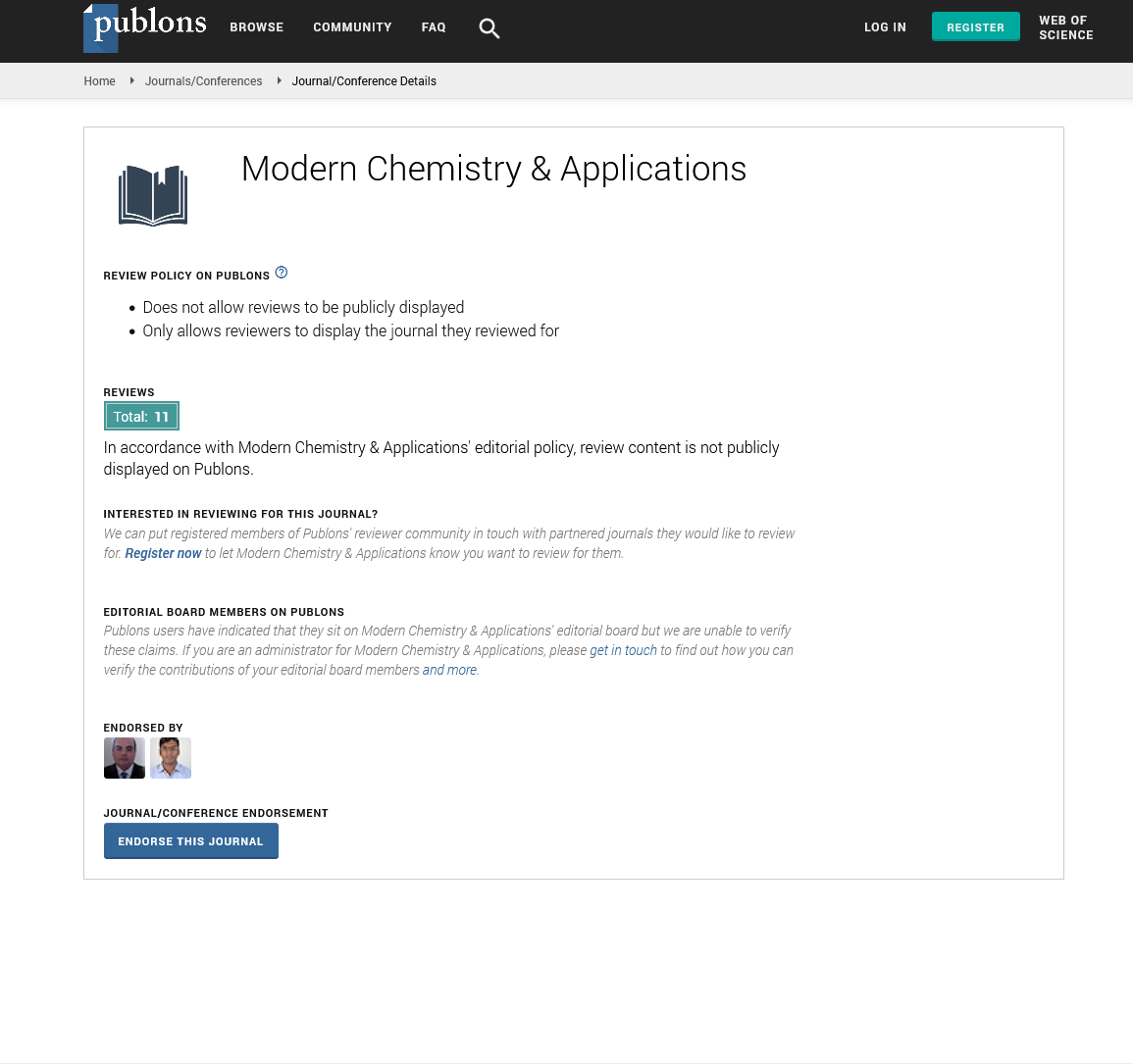Indexed In
- Open J Gate
- JournalTOCs
- RefSeek
- Hamdard University
- EBSCO A-Z
- OCLC- WorldCat
- Scholarsteer
- Publons
- Geneva Foundation for Medical Education and Research
- Google Scholar
Useful Links
Share This Page
Journal Flyer

Open Access Journals
- Agri and Aquaculture
- Biochemistry
- Bioinformatics & Systems Biology
- Business & Management
- Chemistry
- Clinical Sciences
- Engineering
- Food & Nutrition
- General Science
- Genetics & Molecular Biology
- Immunology & Microbiology
- Medical Sciences
- Neuroscience & Psychology
- Nursing & Health Care
- Pharmaceutical Sciences
Commentary - (2024) Volume 12, Issue 1
Nitron Complexes in Cancer Research: A Potential Frontier for Therapeutic Advancements
Hayati Serdar*Received: 01-Jan-2024, Manuscript No. MCA-24-25213; Editor assigned: 03-Jan-2024, Pre QC No. MCA-24-25213 (PQ); Reviewed: 17-Jan-2024, QC No. MCA-24-25213; Revised: 24-Jan-2024, Manuscript No. MCA-24-25213 (R); Published: 31-Jan-2024, DOI: 10.35248/2329-6798.24.12.454
Description
In the region of cancer research, the exploration of novel therapeutic agents has become important, with a particular focus on compounds that exhibit both efficacy and minimal side effects. Nitron complexes, a group of compounds with interesting chemical structures, have recently come under exploration for their potential anticancer properties. This commentary discusses the recent improvement in evaluating the anticancer effects of nitron complexes and explains their mechanisms of action, potential outcomes, and the future of anticancer drug development.
Nitron complexes, characterized by the presence of a nitron functional group, have gained attention due to their diverse chemical properties and potential biological activities. Researchers are increasingly drawn to their unique structures and the possibility of controlling these compounds for therapeutic purposes. As the focus on personalized medicine intensifies, the exploration of novel anticancer agents such as nitron complexes becomes essential, offering new methods for customizing treatments to individual patient profiles.
One of the primary facets of nitron complexes under investigation is their mechanism of action against cancer cells. Studies have suggested that these complexes may exert their anticancer effects through multiple pathways, including interference with cell cycle progression, induction of apoptosis, and inhibition of angiogenesis. Understanding the complex details of these mechanisms is essential for resolving the full therapeutic potential of nitron complexes and optimizing their use in cancer treatment.
The adaptability of nitron complexes extends to their ability to target various types of cancer cells. A preliminary study indicates that these complexes may exhibit activity against a spectrum of cancers, including but not limited to breast, lung, and colon cancers. The fact that nitron complexes can work against various types of cancer makes them even more interesting for further exploration as potential anticancer treatments. This opens up possibilities for a more comprehensive approach to cancer therapy.
In addition to their potential efficacy, the evaluation of nitron complexes also involves an assessment of their safety profile. Anticancer agents must strike a detailed balance between effectively eliminating cancer cells and sparing healthy ones. Preliminary toxicity studies have shown potential results, suggesting that nitron complexes may possess a favorable safety profile, minimizing the risk of adverse effects commonly associated with traditional chemotherapy.
The preclinical studies investigating the anticancer effects of nitron complexes have presented a solid foundation for future research. These studies provide valuable insights into the compounds' pharmacokinetics, bioavailability, and potential drug interactions. However, it is essential to exercise caution and recognize the transitional nature of these findings from translational research. Further research, including well-designed clinical trials, is essential to validate the safety and efficacy of nitron complexes in human subjects.
As the field of cancer research advances, the development of new therapeutic agents like nitron complexes brings conviction for improved outcomes and reduced side effects for cancer patients. These complexes show potential as effective anticancer agents because of their special chemical structures and the multiple ways they work against cancer cells.
In conclusion, the exploration and evaluation of the anticancer effects of nitron complexes signify a potential phase in cancer research. The compounds' diverse chemical properties, potential mechanisms of action, and preliminary safety profiles position them as interesting aspects for further investigation. As study activity progresses, the potential of nitron complexes to contribute to the next generation of anticancer therapeutics becomes increasingly apparent, holding potential for a more targeted and effective approach to cancer treatment.
Citation: Serdar H (2024) Nitron Complexes in Cancer Research: A Potential Frontier for Therapeutic Advancements. Modern Chem Appl. 12:454.
Copyright: © 2024 Serdar H. This is an open-access article distributed under the terms of the Creative Commons Attribution License, which permits unrestricted use, distribution, and reproduction in any medium, provided the original author and source are credited.


